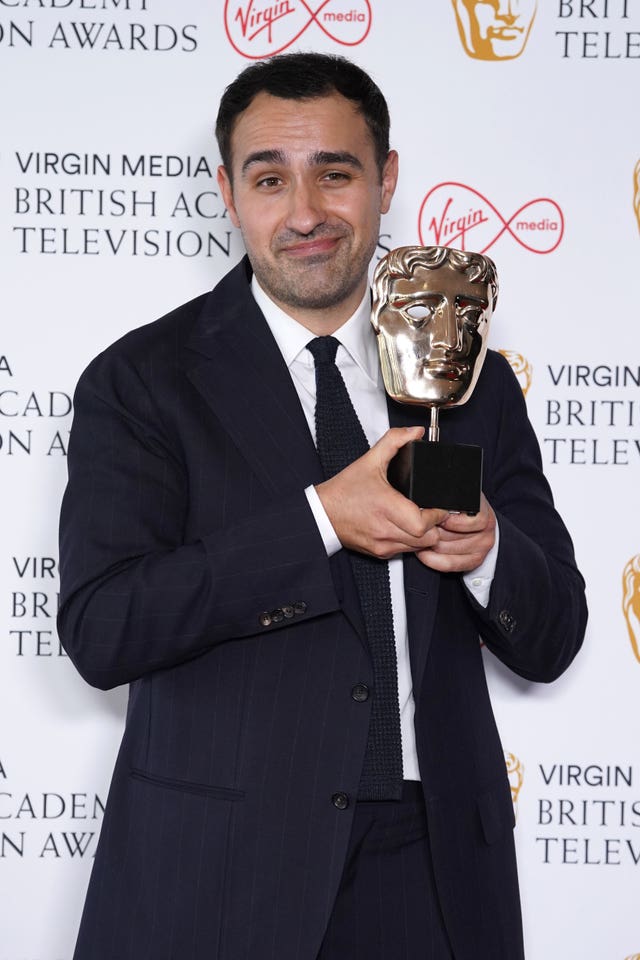Channel 4 enjoys success at TV Baftas amid uncertainty over its future
The annual event featured its first full audience in two years.

Channel 4 has enjoyed a successful afternoon at the Bafta TV Awards amid uncertainty over its future – winning a total of five awards.
The event at the Royal Festival Hall on Southbank in London, which featured its first full audience in two years, also saw the BBC claim nine awards and ITV take home seven.
Hosted by comedian Richard Ayoade, the ceremony celebrated the best of British television across multiple categories.

Jodie Comer claimed the leading actress award for her role in Channel 4’s Help and thanked the broadcaster for “believing in the script”.
Gogglebox won its second TV Bafta for best constructed factual show and the chief executive of production company Studio Lambert, Stephen Lambert, used his speech to voice opposition to the Government’s plans.
He said: “Gogglebox might have ended when it started nine years ago as it got modest ratings, but a publicly owned risk-taking Channel 4 believed in it and they stuck with it.
“If the Government goes ahead with its destructive plan to end Channel 4, these kind of risks will not be taken and a big part of what makes British TV great will have ended for no good reason.”
Mo Gilligan won best comedy entertainment for his The Lateish Show on Channel 4 and said the prize “means so much” because Channel 4 took him on when his mental health was struggling in 2017.

In a statement responding to the criticism, a DCMS spokesperson said: “Channel 4 is a great UK success story and this government wants it to thrive for the long-term.
“Our proposals will improve Channel 4’s access to capital and the ability to make and own content will allow it to create new revenue streams and compete as effectively as possible for audiences, programmes and talent with the streaming giants.”
Jamie Demetriou won a TV Bafta for best male in a comedy for his role in Channel 4’s Stath Lets Flats.
However, despite leading the nominations this year with a total of seven, Channel 4’s It’s A Sin ended the ceremony empty handed.
The BBC came out top of the public service broadcasters with nine prizes in a variety of categories.
Sean Bean won best leading actor prize for his role in gritty prison drama Time.
Producer Simon Maloney read a letter on the actor’s behalf which said he was “overwhelmed” to receive the award.
Time also won best mini series and, collecting the prize, co-actor Stephen Graham said: “We had a phenomenal cast of young working class men who were absolutely outstanding, every single one of them.
“It was an absolute joy to be a part of. This is why I wanted to be an actor as a kid…It was a powerful production.”
Rose Ayling-Ellis and Giovanni Pernice won the must-see moment for their silent dance on BBC One staple Strictly Come Dancing.

Charlotte Moore, the BBC’s chief content officer, said: “I’d like to congratulate all of the winners for creating landmark work, it’s a great tribute to the exceptional talent and programmes who have been recognised and a timely reminder that the BBC continues to deliver public service values with purpose and quality, and especially important in our centenary – a year that looks forward and celebrates British creativity across the UK.”
Among ITV’s successes were Ant and Dec’s Saturday Night Takeaway, which claimed the first award of the event, for best entertainment programme, and the news coverage award, which went to ITV News At Ten for its work on the storming of the US Capitol.
Both Together scriptwriter Dennis Kelly and In My Skin creator Kayleigh Llewellyn took aim at the Conservative Government in their speeches, with the latter urging to audience to vote the Tories out of power. However, neither speech was broadcast in the final edit of the programme.
Bafta chairman Krishnendu Majumdar opened the event with a speech addressing diversity and the changing media landscape, before paying tribute to TV journalists working in Ukraine and Sir Billy Connolly, who received a Bafta fellowship.
Ayoade quickly aimed a jibe at Will Smith over his slap at the Oscars, quipping: “Bafta is celebrating 75 years at the heart of our industry.
“In 1955, there were only six categories, barely enough time to get up from your seat and slap someone before the whole ceremony would be over.”





